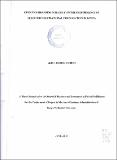Effect of Branding Strategy on the Performance of Selected Multinational Corporations in Kenya

View/
Date
2018-06Author
Ochoo, Alice Damar
Type
ThesisLanguage
enMetadata
Show full item recordAbstract
Globally, multinational corporations have played a critical role in international trade and are key players in the economic activities in host countries including Kenya. The concept of a branding is now considered one of the most powerful ideas in the business world. Many multinational corporations (MNC) operating in Kenya have faced fierce competition both locally and internationally. The purpose of this study was to investigate the effects of branding strategy on the performance of Multinational Corporations in Kenya. The objective of the study was to establish the effect of the brand element, brand name, and brand identity and brand personality on the performance of Kenyan MNCs. The study was based on three theories namely; Connectionist Theories, Resource Based Theory and Mckinsey 7S Model. The study adopted a descriptive, research design which targeted 122 management staff from selected MNCs operating in Kenya (Coca-Cola, Cadbury East Africa, Haco Tiger Brands and Uniliver Kenya). The target respondents were all 122 management employees of the selected firms participated in the study. Data was collected using questionnaires that had both closed and open-ended questions. Analysis was done using both qualitative and quantitative techniques. Regression and correlation analysis was used to make the statistical inferences and hypothesis testing. The findings -were interpreted based on research hypothesis and presented in form of tables and figures. The study found out that all the selected MN Cs actively participated in practices aimed at branding their firms. It was also found out that four main branding strategies had been adopted in the MNCs to a large extent, these includes; Brand Personality, Brand Name, Brand Element and Brand Identity. Additionally, branding strategies had a positive effect on the performance of the MNCs. Further, the results indicated that only Brand Identity and Brand Personality were significant with p-values of less than 0.05. Therefore, the study concluded that formulation and implementation of branding strategies by the MNCs will translate to improved organizational performance. To remain profitable and relevant in the current dynamic market environments, the study concludes that it is essential to constantly brand the firms. The study recommended that the management at the MNCs to highly prioritize the formulation and implementation of the brand element, brand personality, brand name and brand identity strategies. The managements in the MNCs are also recommended to constantly evaluate the effectiveness and efficiency of the branding strategies in achieving the desired results. Additionally, measures for attracting and retaining MNCs should be employed through strategic positioning of the country's available policies and frameworks.
Publisher
KeMU
